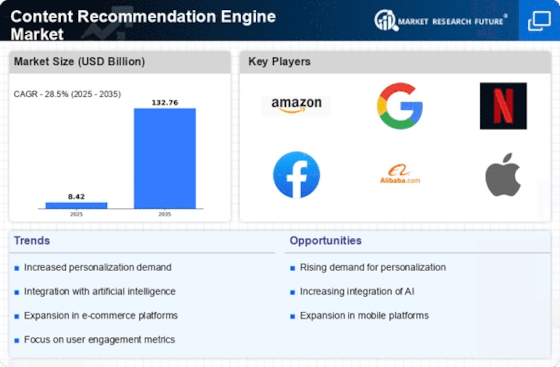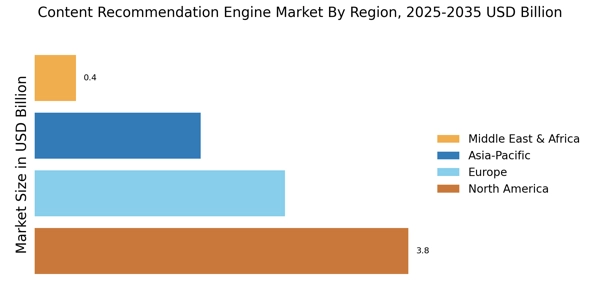Expansion of E-commerce Platforms
The rapid expansion of e-commerce platforms is a significant driver in the Content Recommendation Engine Market. As online shopping continues to gain traction, businesses are increasingly adopting recommendation engines to enhance the shopping experience. These engines analyze consumer behavior and preferences, providing personalized product suggestions that can lead to increased sales. Market data reveals that e-commerce companies utilizing recommendation systems experience conversion rates that are 5 to 10 times higher than those that do not. This trend underscores the importance of integrating content recommendation technologies into e-commerce strategies. As more retailers recognize the value of personalized shopping experiences, the demand for sophisticated recommendation engines is expected to rise, further propelling market growth.
Increased Focus on User Engagement
User engagement remains a central focus within the Content Recommendation Engine Market. Companies are increasingly aware that engaging users effectively can lead to higher conversion rates and customer loyalty. As a result, there is a growing emphasis on developing recommendation systems that not only suggest content but also foster interaction. Market analysis indicates that platforms prioritizing user engagement through personalized recommendations are witnessing a significant uptick in user retention rates. This trend is further supported by data showing that businesses implementing advanced recommendation engines report up to a 40% increase in user engagement metrics. Therefore, enhancing user engagement through tailored content recommendations is becoming a strategic imperative for organizations aiming to thrive in a competitive landscape.
Growing Importance of Data Analytics
The growing importance of data analytics is reshaping the Content Recommendation Engine Market. Organizations are increasingly leveraging data analytics to gain insights into consumer behavior and preferences, which in turn informs the development of effective recommendation systems. The ability to analyze large datasets allows businesses to create more accurate and relevant content recommendations. Market trends indicate that companies investing in data analytics tools are likely to see improved performance in their recommendation engines, with some reporting up to a 30% increase in user satisfaction. This emphasis on data-driven decision-making is fostering innovation within the industry, as organizations seek to refine their content delivery strategies and enhance user experiences through tailored recommendations.
Rising Demand for Personalized Content
The Content Recommendation Engine Market is experiencing a notable surge in demand for personalized content. As consumers increasingly seek tailored experiences, businesses are compelled to adopt recommendation engines that analyze user behavior and preferences. This trend is reflected in the market data, which indicates that the personalization segment is projected to grow at a compound annual growth rate of over 30% in the coming years. Companies are leveraging advanced algorithms to enhance user engagement and retention, thereby driving revenue growth. The ability to deliver relevant content not only improves customer satisfaction but also fosters brand loyalty. Consequently, organizations are investing significantly in content recommendation technologies to meet these evolving consumer expectations.
Advancements in Artificial Intelligence
The integration of artificial intelligence (AI) technologies is a pivotal driver in the Content Recommendation Engine Market. AI enhances the capabilities of recommendation engines by enabling them to process vast amounts of data and learn from user interactions. This technological evolution allows for more accurate predictions of user preferences, thereby improving content relevance. Market data suggests that AI-driven recommendation systems are expected to account for a substantial share of the market, with growth rates exceeding 25% annually. As businesses recognize the potential of AI to optimize content delivery, investments in AI-powered solutions are likely to escalate. This trend not only streamlines operations but also enhances the overall user experience, making it a critical factor in the industry's expansion.

















